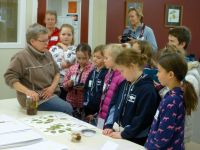Kaniere visit Lincoln
On the 17th August 2017, Manaaki Whenua – Landcare Research Lincoln hosted a visit by Kaniere School. Teacher Kristine Hickford brought along 11 excited primary school students and their caregivers. Matt Stanford from the Enviroschools network also joined us for the day.
The students came to engage with our researchers and learn about the Allan Herbarium, weed identification, biocontrol, and the national flax (harakeke) collection.
Kaniere School in Westland was one of the nine schools visited by Murray Dawson and his colleagues last year as part of Winning the War against Weeds, a Curious Minds outreach project. This reciprocal visit to our research centre was a great opportunity to re-engage with Kaniere School and show them more of the science behind our in-school visits.
Ines Schonberger started the day with a tour of the Allan Herbarium. The students learnt that the Allan Herbarium is a Nationally Significant Collection that holds 640,000 specimens – the largest collection in New Zealand. Specimens collected by Captain Cook's botanists – Banks and Solander – are found here, and indeed also those collected last year by the students themselves.
Kaniere School also learnt how to process specimens, from pressing and drying freshly collected plants to accessioning them into our herbarium vaults.
Next, they were off to the Computer Training Room, where Murray helped the students explore their iNaturalist NZ Kaniere School project. This project was created by uploading the smartphone weed observations made by the students behind their school grounds when Murray and Robinne Weiss first visited.
They then successfully identified several weeds using the interactive key developed by Murray. The uptake of new concepts and technology from even primary school students is quite remarkable.
Hugh Gourlay then taught the students about weed biocontrol. They loved looking down our microscopes at gorse seed weevils, gorse spider mites, and green thistle beetles. Hugh also showed them through his Containment Facility, where they saw where insects were raised under controlled conditions and assessed for potential release as biocontrol agents.
Last but not least, Katarina Tawiri and Mihi Adams hosted the students outside at the National New Zealand Flax Collection. This was a hands-on session, where the students extracted muka (harakeke fibre) and used traditional weaving techniques to make containers and other items to take home with them.
The teachers, caregivers, and students had an informative and enjoyable day with us. The lessons they learnt about our research will no doubt be taken back to their community.
Also see our:

Ines Schoenberger with Kaniere School students in the Allan Herbarium workroom

Ines Schoenberger with Kaniere School students in the Allan Herbarium workroom

Ines Schoenberger showing Kaniere School students Allan Herbarium specimens

Kaniere School students examining Allan Herbarium specimens

Kaniere School student and parent examining Allan Herbarium specimen

Herbarium specimens collected during Captain Cook's first voyage

Murray Dawson helping Kaniere School students explore their iNaturalist NZ project

Hugh Gourlay showing Kaniere School students biocontrol insects

Kaniere School student looking at biocontrol insects through a microscope

Hugh Gourlay shows Kaniere School students one of the rearing rooms in his Containment Facility

Katarina Tawiri and Kaniere School students in the NZ Flax Collection

Katarina Tawiri and Kaniere School students in the NZ Flax Collection

Katarina Tawiri and Kaniere School students in the NZ Flax Collection

Extracting muka - harakeke fibre

Kaniere School student using traditional weaving techniques to make a container
